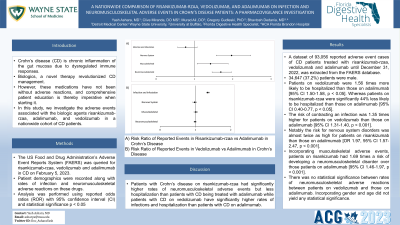Monday Poster Session
Category: IBD
P2117 - A Nationwide Comparison of Risankizumab-rzaa, Vedolizumab, and Adalimumab on Infection and Neuromusculoskeletal Adverse Events in Crohn’s Disease Patients: A Pharmacovigilance Investigation
Monday, October 23, 2023
10:30 AM - 4:15 PM PT
Location: Exhibit Hall

Has Audio

Yash P. Ashara, MBBS
Mayo Clinic
Rochester, MN
Presenting Author(s)
Yash P. Ashara, MBBS1, Clive J. Miranda, DO, MS2, Murad H. Ali, MD2, Gregory D. Gudleski, PhD2, Bhavtosh Dedania, MD3
1Mayo Clinic, Rochester, MN; 2University at Buffalo, Buffalo, NY; 3HCA Florida Brandon Hospital, Brandon, FL
Introduction: Crohn’s disease (CD) is chronic inflammation of the gut mucosa due to dysregulated immune responses. Biologics, a novel therapy revolutionized CD management. However, these medications have not been without adverse reactions, and comprehensive patient education is thereby imperative when starting it. In this study, we investigate the adverse events associated with the biologic agents risankizumab-rzaa, adalimumab, and vedolizumab in a nationwide cohort of CD patients.
Methods: The US Food and Drug Administration’s Adverse Event Reports System (FAERS) was queried for risankizumab-rzaa, vedolizumab and adalimumab in CD on February 5, 2023. Patient demographics were recorded along with rates of infection and neuromusculoskeletal adverse reactions on these drugs. Analysis was performed using reported odds ratios (ROR) with 95% confidence interval (CI) and statistical significance p < 0.05
Results: A dataset of 93,056 reported adverse event cases of CD patients treated with risankizumab-rzaa, vedolizumab and adalimumab until December 31, 2022, was extracted from the FAERS database. 34,647 (37.2%) patients were male. Patients on vedolizumab were 1.56 times more likely to be hospitalized than those on adalimumab [95% CI 1.50-1.58, p < 0.05]. Whereas patients on risankizumab-rzaa were significantly 44% less likely to be hospitalized than those on adalimumab [95% CI 0.40-0.77, p < 0.05]. The risk of contracting an infection was 1.35 times higher for patients on vedolizumab than those on adalimumab [95% CI 1.31-1.40, p < 0.001]. Notably the risk for nervous system disorders was almost twice as high for patients on risankizumab than those on adalimumab [OR 1.97, 95% CI 1.57-2.47, p < 0.001]. Incorporating musculoskeletal adverse events, patients on risankizumab had 1.69 times a risk of developing a neuromusculoskeletal disorder over those patients on adalimumab [95% CI 1.46-1.97, p < 0.001]. There was no statistical significance between rates of neuromusculoskeletal adverse reactions between patients on vedolizumab and those on adalimumab. Incorporating gender and age did not yield any statistical significance.
Discussion: Patients with Crohn’s disease on risankizumab-rzaa had significantly higher rates of neuromusculoskeletal adverse events but less hospitalization than patients with CD being treated with adalimumab while patients with CD on vedolizumab have significantly higher rates of infections and hospitalization than patients with CD on adalimumab.

Disclosures:
Yash P. Ashara, MBBS1, Clive J. Miranda, DO, MS2, Murad H. Ali, MD2, Gregory D. Gudleski, PhD2, Bhavtosh Dedania, MD3. P2117 - A Nationwide Comparison of Risankizumab-rzaa, Vedolizumab, and Adalimumab on Infection and Neuromusculoskeletal Adverse Events in Crohn’s Disease Patients: A Pharmacovigilance Investigation, ACG 2023 Annual Scientific Meeting Abstracts. Vancouver, BC, Canada: American College of Gastroenterology.
1Mayo Clinic, Rochester, MN; 2University at Buffalo, Buffalo, NY; 3HCA Florida Brandon Hospital, Brandon, FL
Introduction: Crohn’s disease (CD) is chronic inflammation of the gut mucosa due to dysregulated immune responses. Biologics, a novel therapy revolutionized CD management. However, these medications have not been without adverse reactions, and comprehensive patient education is thereby imperative when starting it. In this study, we investigate the adverse events associated with the biologic agents risankizumab-rzaa, adalimumab, and vedolizumab in a nationwide cohort of CD patients.
Methods: The US Food and Drug Administration’s Adverse Event Reports System (FAERS) was queried for risankizumab-rzaa, vedolizumab and adalimumab in CD on February 5, 2023. Patient demographics were recorded along with rates of infection and neuromusculoskeletal adverse reactions on these drugs. Analysis was performed using reported odds ratios (ROR) with 95% confidence interval (CI) and statistical significance p < 0.05
Results: A dataset of 93,056 reported adverse event cases of CD patients treated with risankizumab-rzaa, vedolizumab and adalimumab until December 31, 2022, was extracted from the FAERS database. 34,647 (37.2%) patients were male. Patients on vedolizumab were 1.56 times more likely to be hospitalized than those on adalimumab [95% CI 1.50-1.58, p < 0.05]. Whereas patients on risankizumab-rzaa were significantly 44% less likely to be hospitalized than those on adalimumab [95% CI 0.40-0.77, p < 0.05]. The risk of contracting an infection was 1.35 times higher for patients on vedolizumab than those on adalimumab [95% CI 1.31-1.40, p < 0.001]. Notably the risk for nervous system disorders was almost twice as high for patients on risankizumab than those on adalimumab [OR 1.97, 95% CI 1.57-2.47, p < 0.001]. Incorporating musculoskeletal adverse events, patients on risankizumab had 1.69 times a risk of developing a neuromusculoskeletal disorder over those patients on adalimumab [95% CI 1.46-1.97, p < 0.001]. There was no statistical significance between rates of neuromusculoskeletal adverse reactions between patients on vedolizumab and those on adalimumab. Incorporating gender and age did not yield any statistical significance.
Discussion: Patients with Crohn’s disease on risankizumab-rzaa had significantly higher rates of neuromusculoskeletal adverse events but less hospitalization than patients with CD being treated with adalimumab while patients with CD on vedolizumab have significantly higher rates of infections and hospitalization than patients with CD on adalimumab.

Figure: A) Risk Ratio of Reported Events in Risankizumab-rzaa vs Adalimumab in Crohn’s Disease;
B) Risk Ratio of Reported Events in Vedolizumab vs Adalimumab in Crohn’s Disease
B) Risk Ratio of Reported Events in Vedolizumab vs Adalimumab in Crohn’s Disease
Disclosures:
Yash Ashara indicated no relevant financial relationships.
Clive Miranda indicated no relevant financial relationships.
Murad Ali indicated no relevant financial relationships.
Gregory Gudleski indicated no relevant financial relationships.
Bhavtosh Dedania indicated no relevant financial relationships.
Yash P. Ashara, MBBS1, Clive J. Miranda, DO, MS2, Murad H. Ali, MD2, Gregory D. Gudleski, PhD2, Bhavtosh Dedania, MD3. P2117 - A Nationwide Comparison of Risankizumab-rzaa, Vedolizumab, and Adalimumab on Infection and Neuromusculoskeletal Adverse Events in Crohn’s Disease Patients: A Pharmacovigilance Investigation, ACG 2023 Annual Scientific Meeting Abstracts. Vancouver, BC, Canada: American College of Gastroenterology.

